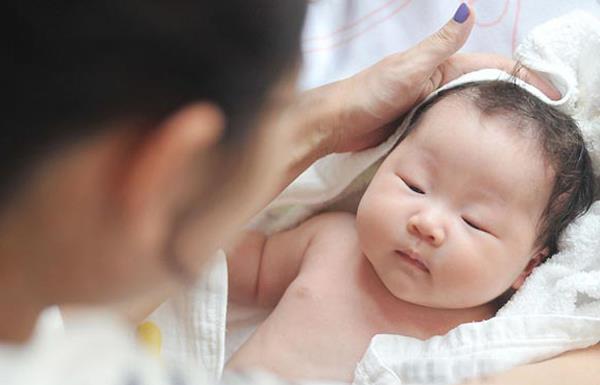Mom can easily recognize dangerous signs of disease in babies through daily expressions on the body of the baby.
To view this video please enable JavaScript, and consider upgrading to a web browser that supports HTML5 video
7 signs of dangerous illness, mothers need to immediately bring their baby to a doctor (QC)
There are seemingly very normal symptoms in a newborn, but if the mother does not observe it carefully, it can be a sign of a dangerous illness that if not treated in time, she can lose her baby.
see more
content
1. Strange and large mole appearance
2. Babies suffer from excessive hair loss
3. Signs your child has difficulty breathing
4. Instant tapering
5. Hearing loss in children
6. Signs of dehydration in a newborn
7. Babies snore loudly
There are seemingly very normal symptoms in a newborn, but if the mother does not observe it carefully, it can be a sign of a dangerous illness that if not treated in time, she can lose her baby. Here are 7 symptoms mothers need to worry about:
1. Strange and large mole appearance
Suddenly a large mole (> 6mm) appears on the baby's body, which can be a sign of a dangerous disease because some mole blasts have a high risk of becoming malignant. You should pay attention to the location of the moles and observe the changes once a month during the bath.
If the mole changes in size, shape, or color ... you should bring your baby to a doctor now because all these signs are potentially the possibility of a skin cancer.

Hair loss is normal, but babies often lose hair, even after 6 months, mothers need to be careful
2. Babies suffer from excessive hair loss
After birth , babies often experience hair loss, which is not a concern. However, if the baby continues to lose a lot of hair after being 6 months old, parents need to contact the doctor for timely examination because they may have:
Fungal infection of the scalp with symptoms such as hair loss in round patches, red, dry, flaky skin ...
Baby is bald, because the immune system attacks the hair roots, making hair grow very slowly.
3. Signs your child has difficulty breathing
Usually, the child's breathing rate ranges from 20-40 beats / minute. In the morning, when baby wakes up, his breathing will increase a little faster.
If the infant is short of breath , has difficulty breathing, the chest is vibrating, breathing through the nose, it is very likely that the child is suffering from laryngeal respiratory failure. In addition to informing the doctor, the mother should breastfeed the baby evenly and drink plenty of water. If your child is having difficulty breathing and is accompanied by a pale or pale blue or pale lip, mouth, or face, the child should be taken to hospital immediately.

"Quick treatment" when an infant suffers from a stuffy nose or wheezing Not only due to changing weather or the flu, there are many causes of a stuffy nose to wheeze. Parents need to carefully monitor the baby and give appropriate handling to help the baby quickly get rid of this unpleasant situation.
4. Instant tapering
When the baby is born, the anterior duct measures 2.5 x 2.5 cm (the line connecting the midpoint of the opposite sides). After 2-3 months of birth, the fontanelle will widen with the increase in the baby's head circumference, gradually shrinking, and then closing in December and 18. If the baby's head of the head is not small, but it is even bigger than after birth, mothers need to be careful. Children may have the following conditions:
Bone retardation due to poor function of the thyroid gland
Rickets, malnutrition, or abnormally enlarged brain causes.
There are some mothers mistakenly believe that a baby that is big, enlarged is a sign of intelligence. It is a superficial realization.
5. Hearing loss in children
Children do not respond when their mother calls out even though they are one year old, immediately think of their hearing problems. Maybe the child is deaf.
To test for deafness, the pediatrician will test the young child for his or her ability to respond to sounds, head injuries, and congenital abnormalities in the head and neck. At the same time, the doctor will investigate the risks if the baby has a history of premature birth , incubation, aggressive treatment of the newborn, severe jaundice or meningitis, encephalitis, and potential risks if the mother has rubella during pregnancy.
6. Signs of dehydration in a newborn
In the case of a baby who is not wet with diapers, many mothers believe that the baby is healthy, but this is the lack of water, thirst and dehydration of the body. Children who are dehydrated often show signs of dry lips, dry mouth, sunken eyes, lethargy, lack of concentration.

Is your baby dehydrated? In addition to the 4 main groups of nutrients, do you know what your baby needs to grow healthy? That is water. Thanks to water, the functions in the body can work harmoniously and smoothly. However, giving the baby too much or too little water will also affect the baby's brain. So for ...
7. Babies snore loudly
Babies who snore loudly may have respiratory problems. Snoring is caused by a blockage or narrowing in the process of air circulation while the baby sleeps.
Snoring due to a cold
Snoring caused by tonsillitis
Snoring has been linked to apnea














